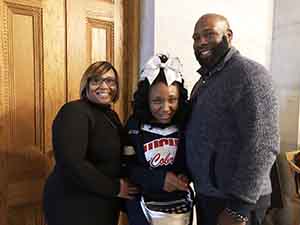The Right to Communicate: From Vanderbilt Kennedy Center's (IDDRC, UCEDD, LEND) Kindred Stories of Disability to Capitol Hill
April 29, 2019

|
| Author: Courtney Taylor |
"Living without being able to communicate is like being behind four glass walls. You are able to see others and they can see you; but you are ignored, or worse, talked down to until you stop remembering who you are and why you are important." -Rick Creech, Augmentative and Alternative Communication user, US Senate testimony [hyperlink: https://www.prentrom.com/articles/making-a-difference-for-others?mode=view]
McKenzie Tuckson is 15 years old and lives in Nashville with her mother and father, Tamara and Josh. McKenzie is a sophomore in high school. She is a cheerleader and vice-president of her class. When McKenzie was in kindergarten, she was diagnosed with Rett syndrome. Rett syndrome is a neurodevelopmental disorder that affects girls almost exclusively. It is characterized by a slowing of development, loss of purposeful use of the hands, challenges with walking and talking, and intellectual disability.
"When we got the diagnosis, we decided right then and there that we were not going to let Rett syndrome define us," said Tamara. "We decided we were going to define it."
McKenzie does have complex communication needs, but she is able to express herself using augmentative and alternative communication (AAC). She has experimented with many different devices over the years. She began with a simple picture communication book. Later on, she moved to an iPad with a communication app, and then to a high-tech dedicated communication device. McKenzie and her family worked with Nashville's Technology Access Center [hyperlink: http://tacnashville.org/], a non-profit organization that provides assessments and services for Tennesseans with disabilities.
"McKenzie's communication devices have meant everything for us," said Tamara. "When she first started using them, she had behavior challenges that all but disappeared because she was finally able to communicate her needs with others. Having a voice has allowed McKenzie to achieve things that most people would not think she could accomplish. However, I want to be clear that while she continues to flourish with the right tools, it has been a constant battle for us to make sure she gets the right supports she needs to communicate effectively in school. It's a struggle to get other people to understand that these devices and picture communication books are McKenzie's voice."
Tennessee Kindred Stories of Disability
Last year, McKenzie and her family were interviewed by Vanderbilt University students as part of the Tennessee Kindred Stories of Disability [hyperlink: https://vkc.mc.vanderbilt.edu/vkc/resources/kindred/] project. The latest Kindred Stories booklet, which is produced each year to educate legislators and policymakers, is focused on the topic of AAC and the right to communicate. AAC was selected as the topic of the 2019 booklet to support work being done at the federal level to propose a national technical assistance center on AAC, and through a workgroup at the Association of University Centers on Disability [hyperlink: https://www.aucd.org/template/index.cfm].
"I decided to participate in Kindred Stories because I am an advocate for people with disabilities," said Tamara. "It is my duty to share our story and to encourage people to tell their stories. When we tell our stories, we help others in lots of different ways. We may help introduce them to services or to organizations that they would benefit from contacting. We may ease their minds because we've been where they are now. We may move elected officials to action because we share how the decisions they are making affect our family. We all need to use our voices and share our stories."
In February, the family took a copy of their Kindred Story to Tennessee Disability Day on the Hill (DDH) and met with legislators to discuss communication. It was their first time to attend and to advocate at DDH, and their experience was documented in a three-minute video [hyperlink: https://vimeo.com/319551293] meant to encourage other families to advocate by sharing their stories with elected officials.
"When our kids are in school, it can sometimes feel like we are advocating alone," said Tamara. "At Disability Day on the Hill, we were a part of a movement of people. Our presence was known. I met people and made connections, and it didn't matter if you had been going for 25 years or it was your first time like us. People were there to get you where you needed to go, to support you in sharing your story, and we felt our connection with the larger disability community."
Federal Disability Policy Seminar and Beyond
The family will travel to Washington, D.C., in April to attend the Disability Policy Seminar [hyperlink: https://disabilitypolicyseminar.org/] and to make visits to Capitol Hill with a whole cohort of Tennessee disability advocates.
In addition, McKenzie used her Kindred Story, her DDH video, and her AAC devices to share her voice and experiences to a group of professionals visiting her high school.
"The school asked McKenzie to show the video and talk about her experiences advocating," said Tamara. "She was the first person with exceptional needs at her school to present to this group. Of course, you know we are proud of her and of all she has accomplished so far. And I won't stop advocating for her and learning. McKenzie will leave high school soon, and there will be a whole new set of issues to advocate about. We have a lot to do, so here we go."
To read McKenzie's story and to browse additional Kindred Stories of Disability collections, visit https://vkc.mc.vanderbilt.edu/vkc/resources/kindred/.
Courtney Taylor is director of VKC Communications.







